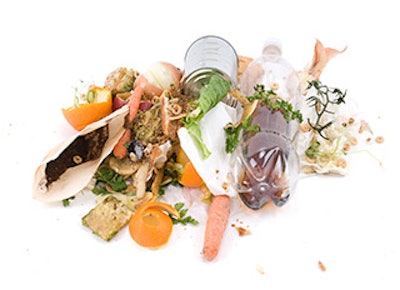
HARTFORD, Conn. (AP) — Efforts to recycle tons of food waste in Connecticut are taking shape, with state officials granting the first permit for a new anaerobic digestion facility in Bridgeport four years after state legislators required certain commercial operations to recycle the organic material.
The 2011 law, which was later revised, required entities that generate about two tons of food waste per week, such as supermarkets, to separate and recycle "food residuals" beginning Jan. 1, 2014. The rule only applies, however, if they're located within 20 miles of a recycling facility.
While there has been a strong desire by Connecticut and other states in recent years to recycle food waste, efforts have been slowed by the insufficient number of facilities available to transform the organic waste into fertilizer and electricity. Three years ago, Connecticut decided to offer $6 million in loans to help developers attract private investment to build digesters.
There are currently three commercial composting centers in Ellington, New Milford and Danbury that accept food scraps but they are limited in capacity. In addition to the planned Bridgeport Bioenergy Facility, which received a state permit on Aug. 10 to construct and operate, there are three other similar digester facilities proposed — two in Southington and one in North Haven. They are in various stages of permitting. There's also the possibility of fifth facility coming online.
Starting this fall, the Department of Energy and Environmental Protection will reach out to other businesses, such as banquet halls and conference centers, to determine whether the law will soon apply to them. If so, DEEP will help them comply. Starting in 2020, producers of one ton of weekly food waste will need to recycle their food waste. DEEP also hopes to encourage other entities, such as college campuses, to voluntarily participate.
"If they had a nearby, convenient option and they could easily arrange the transportation for it, I think it would easily be an option," said Chris Nelson, a supervising environmental analyst at DEEP.
The state's ultimate goal is to remove as much of the typically wet, heavy organic material from the waste stream as possible and ultimately transform it for use improving soil and possibly creating electricity — and reduce trash disposal fees for municipalities. According to a 2010 DEEP study, about 13.5 percent of the state's waste stream, or nearly 322,000 tons annually, includes food that has been thrown away. That figure jumps to 31.5 percent or 750,000 tons annually when other compostable organics such as soiled paper and yard trimmings are included.
"Recycling of organic material results in a soil amendment, or compose, which is beneficial to the earth as your end-product, as opposed to just burning the material in a waste-to-energy plant and having the ash go to an ash landfill," Nelson said.
He likened the process of anaerobic digestion to that of a cow's stomach, where the food waste is kept in an oxygen-starved environment, breaks down and produces gases that can be burned to produce electricity or liquefied to be used off-site. Some types of plants also recycle yard waste or sewage, or a combination of organic material.
Connecticut's law focuses on commercial food waste producers, but there's an interest among some residents to recycle. The Housatonic Resources Recovery Authority recently decided to extend a one-year curbside food waste recycling program in Bridgewater, while also expanding to Ridgefield and New Fairfield this fall.
Lisa Oriard of West Hartford is paying Blue Earth Compost, a private food scrap pick-up service for Hartford and West Hartford, $30 a month to take her family's waste. In return, the company provides compost for her gardens.
Oriard, who participated in a food and yard waste recycling program in Seattle, wants her neighbors to sign on.
"We citizens need to recycle and the food waste is a huge waste and it makes a difference," she said. "It's just like recycling papers and cardboard, but even better because they turn it into dirt."





















